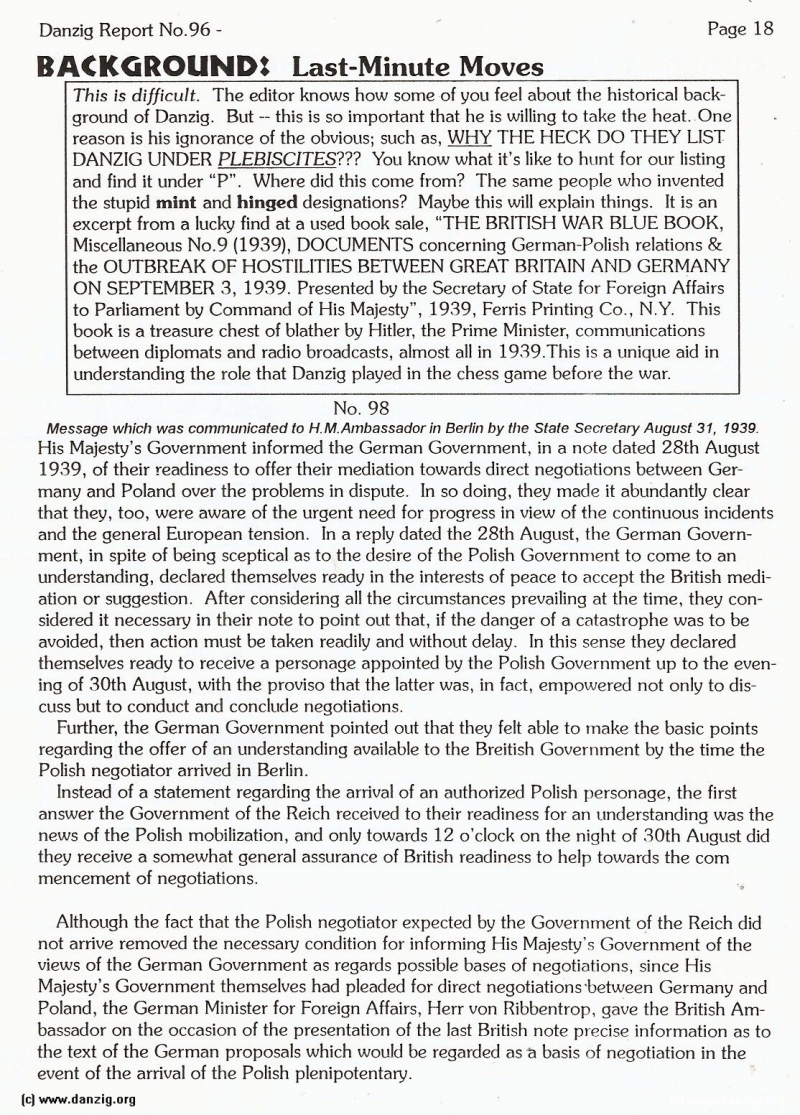
BACKGROUND: Last-Minute Moves
This is difficult. The editor knows how some of you feel about the historical backg round of Danzig. But -- this is so important that he is willing to take the heat. One reason is his ignorance of the obvious; such as, WHY THE HECK DO THEY LIST DANZIG UNDER PLEBISCITES??? You know what it’s like to hunt for our listing and find it under “P”. Where did this come from? The same people who invented the stupid mint and hinged designations? Maybe this will explain things. It is an excerpt from a lucky find at a used book sale, “THE BRITISH WAR BLUE BOOK, Miscellaneous No.9 (1939), DOCUMENTS concerning German-Polish relations & the OUTBREAK OF HOSTILITIES BETWEEN GREAT BRITAIN AND GERMANY ON SEPTEMBER 3, 1939. Presented by the Secretary of State for Foreign Affairs to Parliament by Command of His Majesty”, 1939, Ferris Printing Co., N.Y. This book is a treasure chest of blather by Hitler, the Prime Minister, communications between diplomats and radio broadcasts, almost all in 1939.This is a unique aid in understanding the role that Danzig played in the chess game before the war.
Message which was communicated to H. M.Ambassador in Berlin by the State Secretary August 31, 1939. His Majesty’s Government informed the German Government, in a note dated 28th August 1939, of their readiness to offer their mediation towards direct negotiations between Germ any and Poland over the problems in dispute. In so doing, they made it abundantly clear that they, too, were aware of the urgent need for progress in view of the continuous incidents and the general European tension. In a reply dated the 28th August, the German Governm ent, in spite of being sceptical as to the desire of the Polish Government to come to an understanding, declared themselves ready in the interests of peace to accept the British media tion or suggestion. After considering all the circumstances prevailing at the time, they cons idered it necessary in their note to point out that, if the danger of a catastrophe was to be avoided, then action must be taken readily and without delay. In this sense they declared themselves ready to receive a personage appointed by the Polish Government up to the eveni ng of 30th August, with the proviso that the latter was, in fact, empowered not only to disc uss but to conduct and conclude negotiations.
Further, the German Government pointed out that they felt able to make the basic points regarding the offer of an understanding available to the Breitish Government by the time the Polish negotiator arrived in Berlin.
Instead of a statement regarding the arrival of an authorized Polish personage, the first answer the Government of the Reich received to their readiness for an understanding was the news of the Polish mobilization, and only towards 12 o’clock on the night of 30th August did they receive a somewhat general assurance of British readiness to help towards the com mencement of negotiations.
Although the fact that the Polish negotiator expected by the Government of the Reich did not arrive removed the necessary condition for informing His Majesty’s Government of the views of the German Government as regards possible bases of negotiations, since His Majesty’s Government themselves had pleaded for direct negotiations between Germany and Poland, the German Minister for Foreign Affairs, Herr von Ribbentrop, gave the British Amb assador on the occasion of the presentation of the last British note precise information as to the text of the German proposals which would be regarded as basis of negotiation in the event of the arrival of the Polish plenipotentary.
Danzig Report Vol. 1 - Nr. 96 - July - August - September - 1997, Page 18.
Hits: 2652
Added: 20/07/2015
Copyright: 2024 Danzig.org

